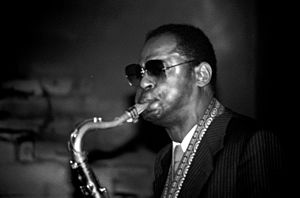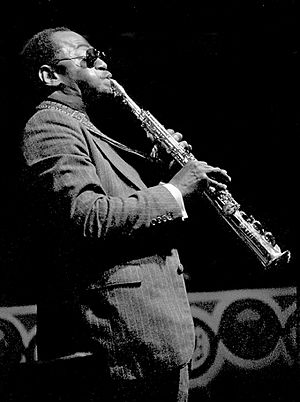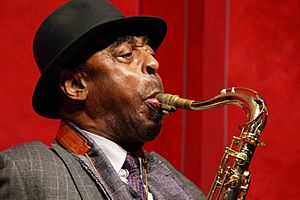Archie Shepp facts for kids
Quick facts for kids
Archie Shepp
|
|
|---|---|
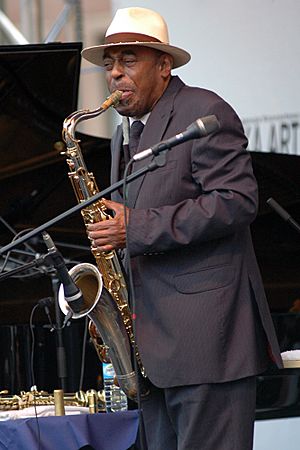
Archie Shepp in Warsaw, 2008
|
|
| Background information | |
| Birth name | Archie Shepp |
| Born | May 24, 1937 Fort Lauderdale, Florida, United States |
| Genres | Jazz, free jazz, avant-garde jazz |
| Occupation(s) | Musician, composer, educator |
| Instruments | Tenor saxophone, soprano saxophone, alto saxophone, piano, vocals |
| Years active | 1960–present |
| Labels | Impulse!, SteepleChase, Denon, BYG Actuel, Marge |
| Associated acts | Cecil Taylor, John Coltrane, Horace Parlan |
Archie Shepp, born on May 24, 1937, is an American jazz musician. He plays the saxophone and is also an educator and a writer. Since the 1960s, he has been very important in creating a new style of jazz called avant-garde jazz. This style often explores new sounds and ways of playing.
Contents
About Archie Shepp
Early Life and Music Beginnings
Archie Shepp was born in Fort Lauderdale, Florida. He grew up in Philadelphia, Pennsylvania. He started playing the banjo with his father. Later, he learned to play the piano and saxophone while in high school. From 1955 to 1959, he studied drama at Goddard College.
After college, Shepp played in a Latin jazz band for a short time. He then joined the band of Cecil Taylor, a famous avant-garde pianist. In 1962, Shepp performed in Helsinki, Finland, with trumpeter Bill Dixon. His first album as a band leader was Archie Shepp - Bill Dixon Quartet, released in 1963. This album included a song by another jazz legend, Ornette Coleman.
Working with Jazz Greats
Shepp also formed a group called the New York Contemporary Five. This group included alto saxophonist John Tchicai and trumpeter Don Cherry.
A very famous jazz musician, John Coltrane, admired Shepp's music. This led to Shepp recording for Impulse! Records. His first album with them was Four for Trane in 1964. On this album, he played mostly Coltrane's songs. He was joined by Tchicai, trombonist Roswell Rudd, trumpeter Alan Shorter, bassist Reggie Workman, and drummer Charles Moffett.
Shepp also took part in recording sessions for Coltrane's album A Love Supreme in late 1964. While his parts were not on the original album, they were released later in 2002. In 1965, Shepp and Coltrane recorded Ascension together. Shepp's important role in avant-garde jazz was clear when he shared an album with Coltrane. This album, New Thing at Newport, released in 1965, had one side by Coltrane and one side by Shepp.
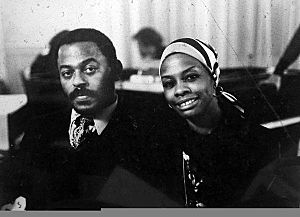
Exploring New Sounds and Ideas
In 1965, Shepp released Fire Music. This album showed his growing interest in political ideas and African culture. The album's title came from a traditional African music style. It also included a poem in memory of Malcolm X, a civil rights leader.
Shepp's 1967 album, The Magic of Ju-Ju, also took its name from African traditions. The music on this album was deeply connected to African sounds. It featured an African percussion group. At this time, many African-American jazz musicians were inspired by African cultures and music. Shepp, along with Pharoah Sanders, was a leader in this movement. The Magic of Ju-Ju helped define Shepp's music for several years. It combined free-flowing avant-garde saxophone playing with African rhythms and ideas.
In 1969, Shepp was invited to perform in Algiers for the Pan-African Cultural Festival. After this, he recorded several albums in Paris.
Shepp continued to experiment in the 1970s. He sometimes included harmonica players and spoken word poets in his groups. With his 1972 albums Attica Blues and The Cry of My People, he spoke out for civil rights. Attica Blues was a response to the Attica Prison riots, a major event in American history.
Shepp also writes plays. His works include The Communist (1965) and Lady Day: A Musical Tragedy (1972).
Teaching and Later Music
In the late 1960s, Shepp began teaching. He became a professor of African-American Studies at SUNY in Buffalo, New York. In 1971, he joined the University of Massachusetts Amherst. He taught music there for 30 years. His first two courses were about "Revolutionary Concepts in African-American Music" and "Black Musician in the Theater."
From the late 1970s onwards, Shepp continued to explore different musical styles. He kept playing African music. He also recorded blues songs, ballads, and spirituals. On his 1977 album Goin' Home, he played with Horace Parlan. He also paid tribute to older jazz figures like Charlie Parker and Sidney Bechet. Sometimes, he even played R&B and recorded with European artists.
Recent Career Highlights
Archie Shepp was featured in the 1981 documentary film Imagine the Sound. In this film, he talks about and performs his music and poetry. He also appeared in Mystery, Mr. Ra, a 1984 French documentary about Sun Ra, another unique jazz artist. The film shows Shepp playing with Sun Ra's band, the Arkestra.
Since the early 1990s, Shepp has often played with French trumpeter Eric Le Lann. In 1993, he worked with Michel Herr to create music for the film Just Friends.
In 2002, Shepp was part of the Red Hot Organization's album Red Hot and Riot. This album honored Fela Kuti, a famous Nigerian musician. Shepp appeared on a song called "No Agreement." In 2004, Archie Shepp started his own record label, Archieball, with Monette Berthomier. This label is in Paris, France. It features collaborations with other musicians like Jacques Coursil and Monica Passos.
Discography
See also
 In Spanish: Archie Shepp para niños
In Spanish: Archie Shepp para niños
 | Georgia Louise Harris Brown |
 | Julian Abele |
 | Norma Merrick Sklarek |
 | William Sidney Pittman |


